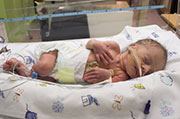- 8 Ways to Increase Dopamine Naturally
- 7 Best Breads for Maintaining Stable Blood Sugar
- Gelatin vs. Collagen: Which is Best for Skin, Nails, and Joints?
- The Long-Term Effects of Daily Turmeric Supplements on Liver Health
- Could Your Grocery Store Meat Be Causing Recurring UTIs?
- Are You Making This Expensive Thermostat Error This Winter?
- Recognizing the Signs of Hypothyroidism
- 10 Strategies to Overcome Insomnia
- Could Artificial Sweeteners Be Aging the Brain Faster?
- Techniques for Soothing Your Nervous System
Early Birth Linked to Introversion, Neuroticism in Adult Life


Adults who were severely underweight at birth or who were born very prematurely may be more likely to be introverted, neurotic and afraid to take risks, a new European study suggests.
The findings may help explain why these adults are more likely to have relationship and career problems, the researchers contended. However, the study did not prove a cause-and-effect relationship.
Babies born at less than 32 weeks of pregnancy were considered very premature in the study, while those born at about 3.3 pounds were considered a very low birth weight.
Researchers led by Dieter Wolke, a professor in the psychology department at the University of Warwick in England, compared the personality traits of hundreds of 26-year-old men and women in Bavaria, Germany. Two hundred had been born very prematurely and/or severely underweight, while 197 were born at term and within the normal weight range.
Compared to those in the control group, participants who were born very prematurely and/or underweight had much higher levels of autistic behaviors, introversion, neuroticism (tenseness and anxiety) and agreeableness, and lower levels of being open to new experiences and conscientiousness.
People with this group of character traits are considered to have a “socially withdrawn personality.” That means they are less social, less communicative, easily worried and less likely to take risks, according to Wolke and his colleagues.
Findings from the study were published online July 27 in the Archives of Disease in Childhood.
Children who are born very prematurely and/or severely underweight likely experience high levels of stress in neonatal intensive care. That stress may affect their brain development, the authors suggested.
Many adults who were very premature and/or severely underweight babies have long-lasting problems. They’re less likely to achieve higher levels of education or get well-paid jobs, have a harder time making friends or finding long-term partners, and are less likely to have children, the researchers noted.
More information
The March of Dimes has more about premature babies.
Source: HealthDay
Copyright © 2026 HealthDay. All rights reserved.










